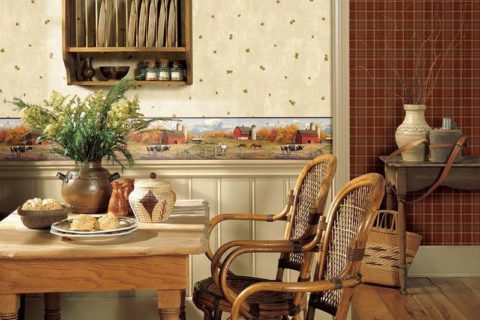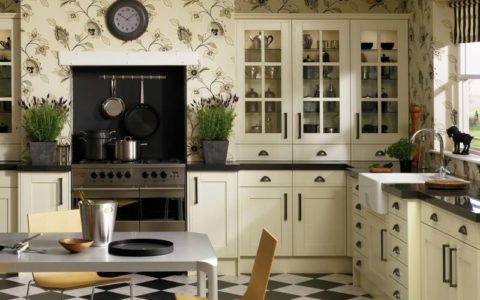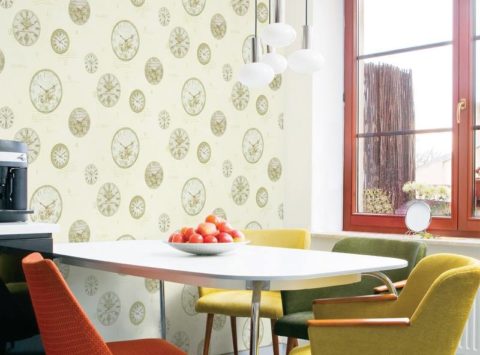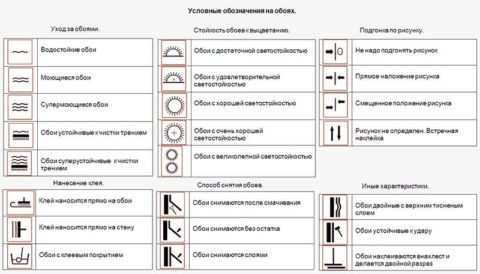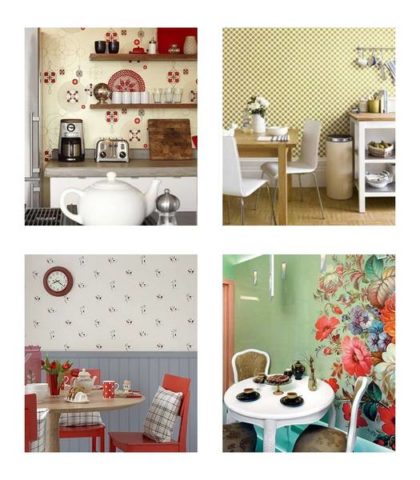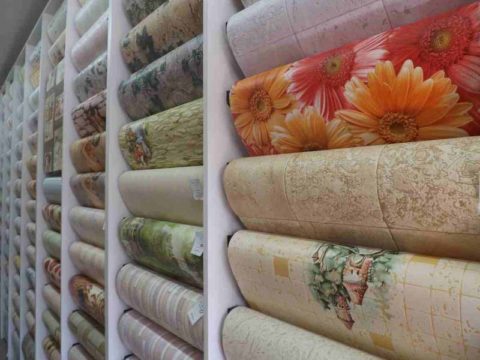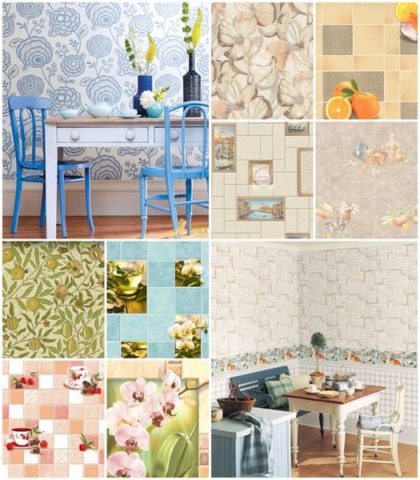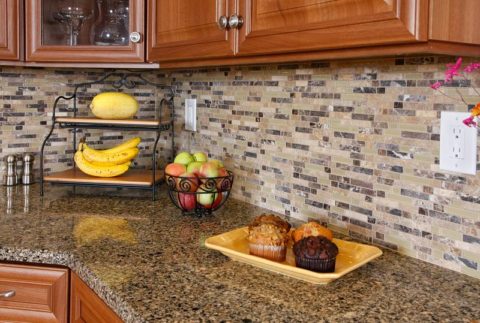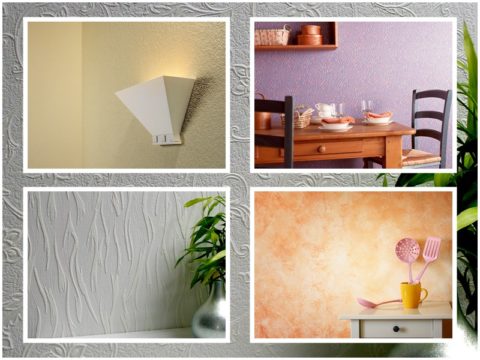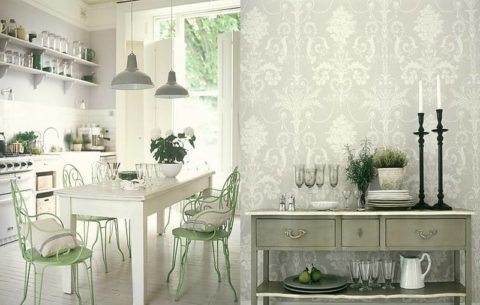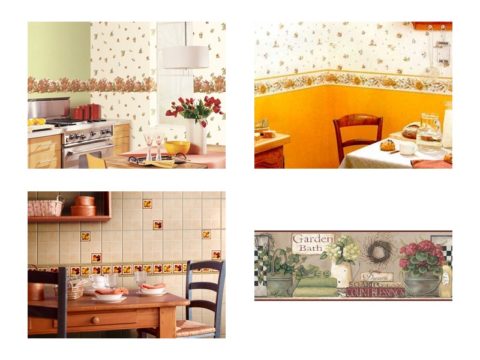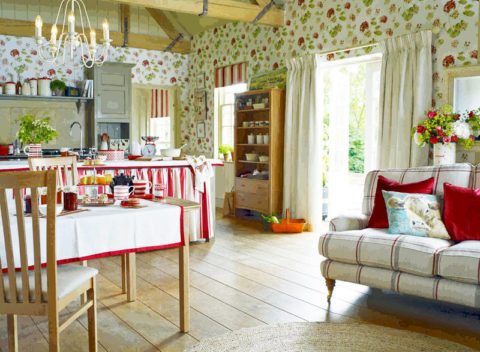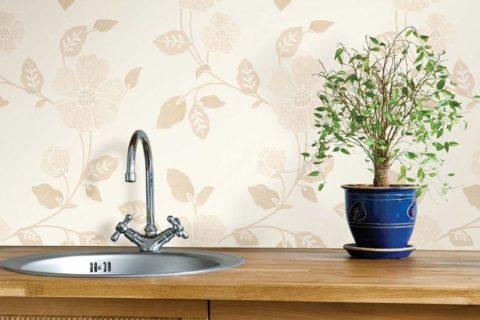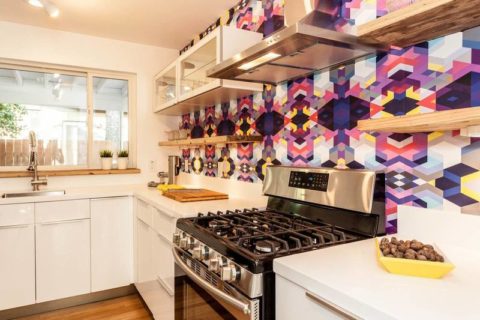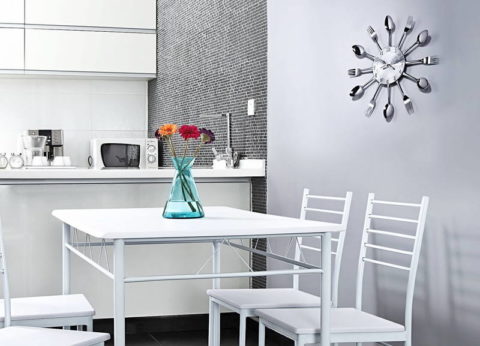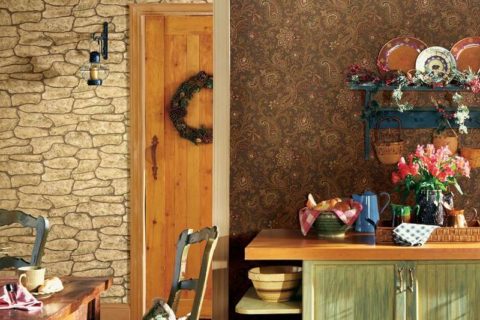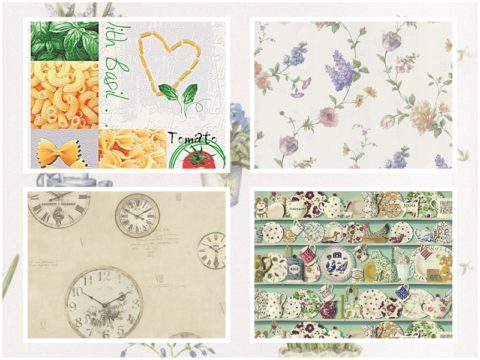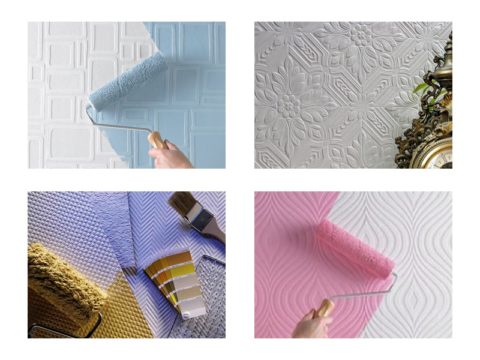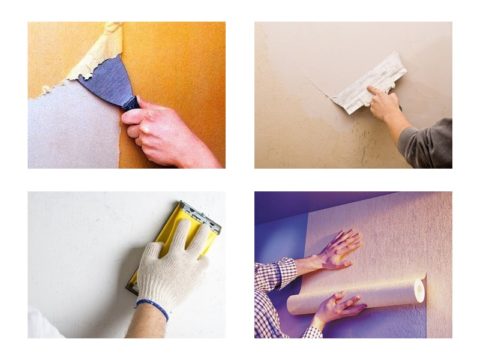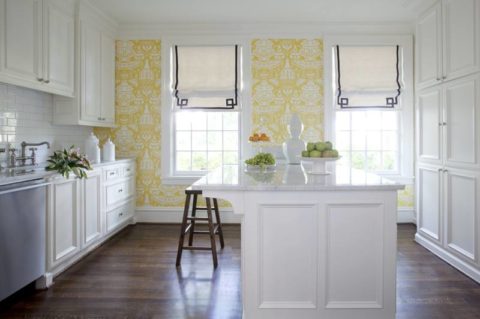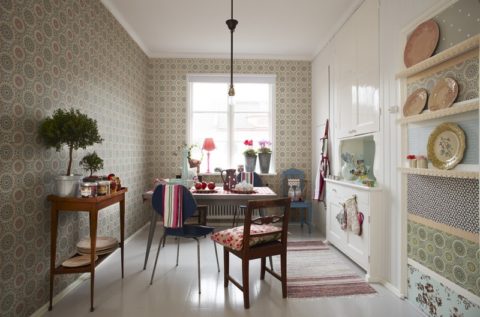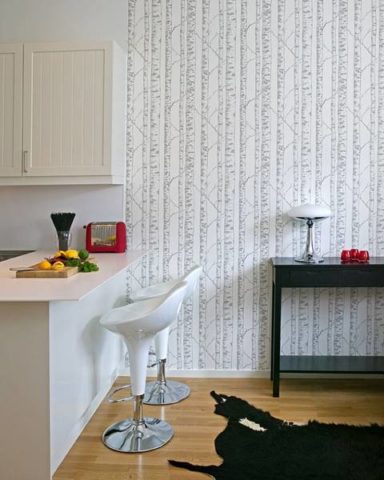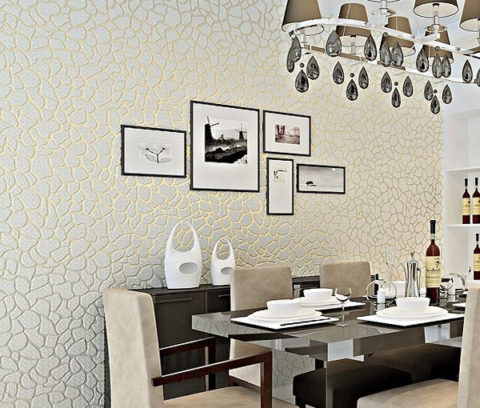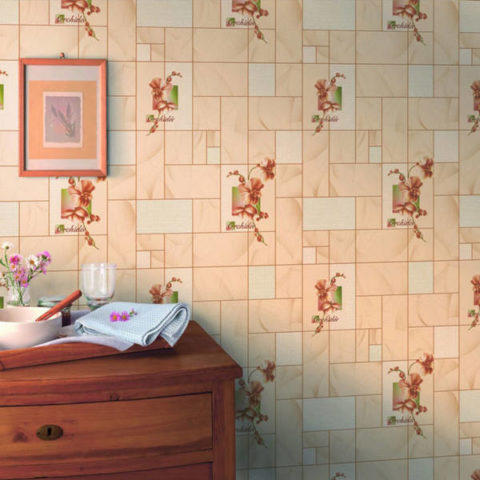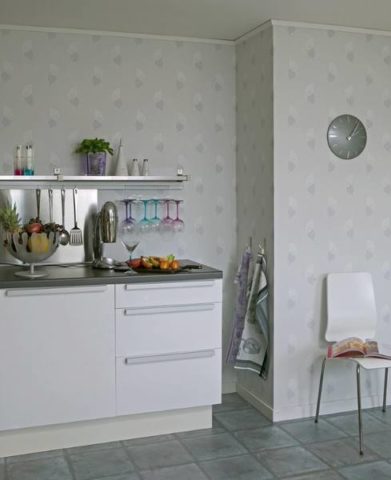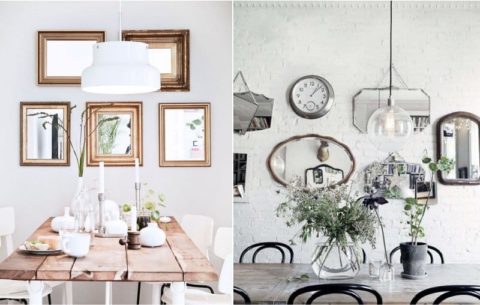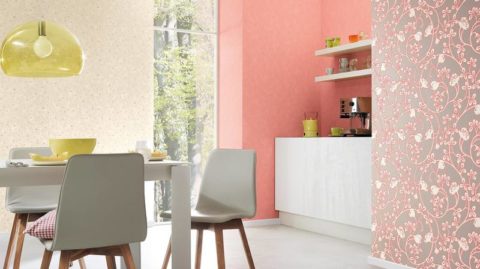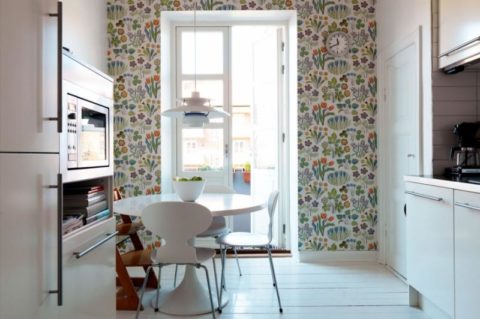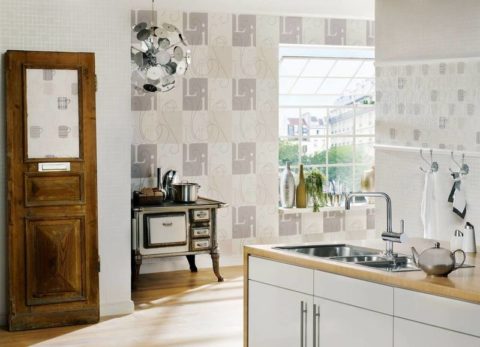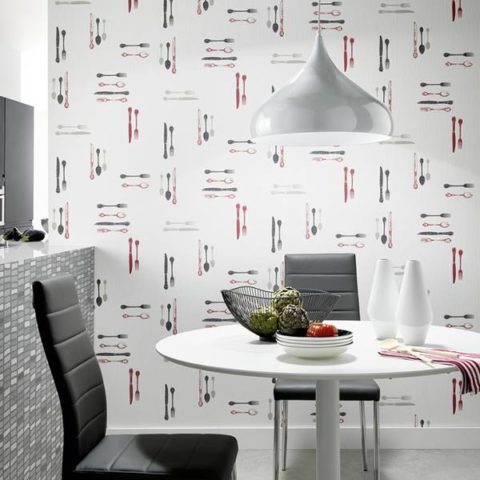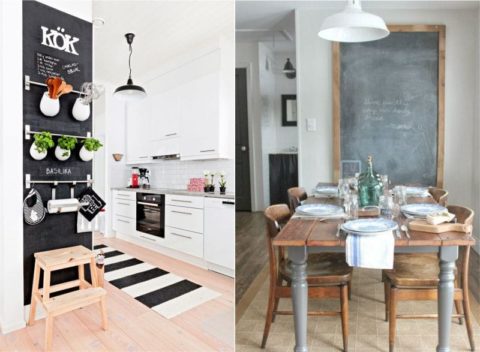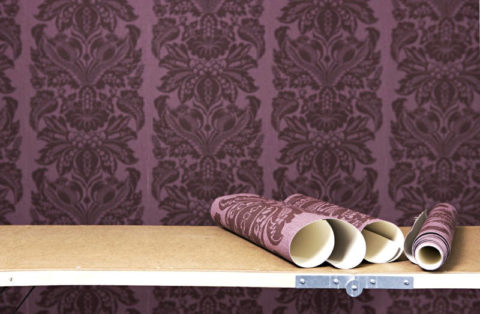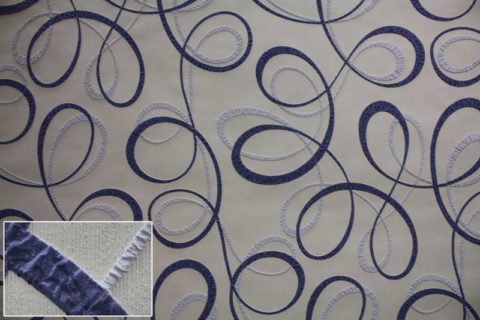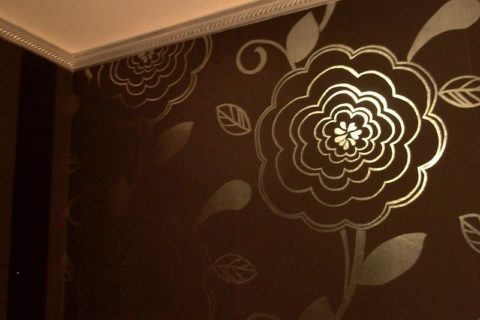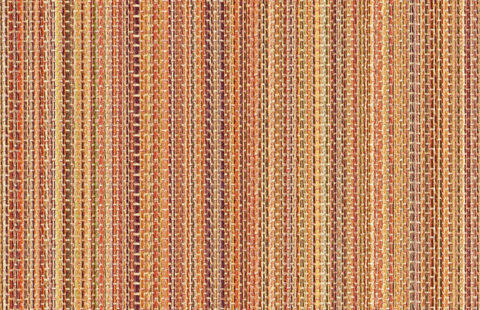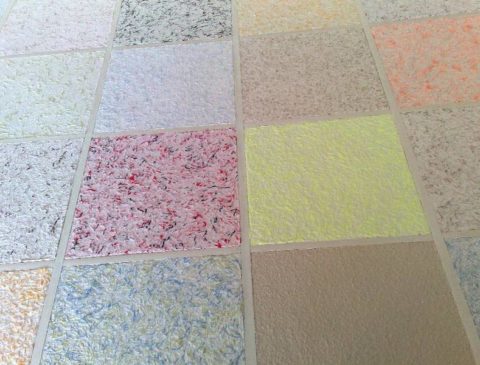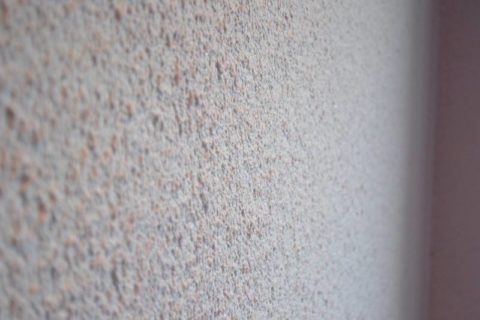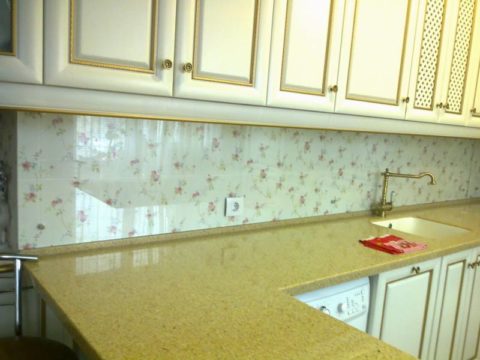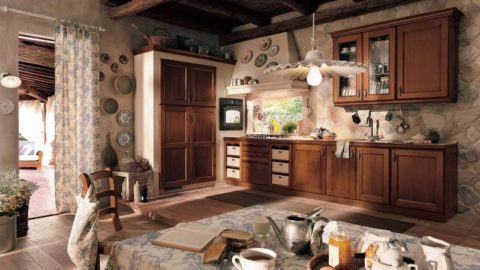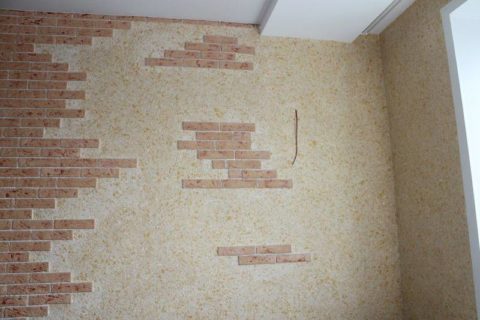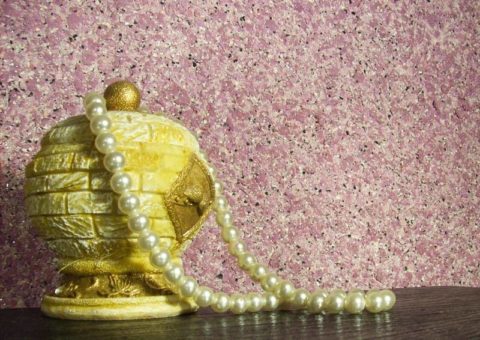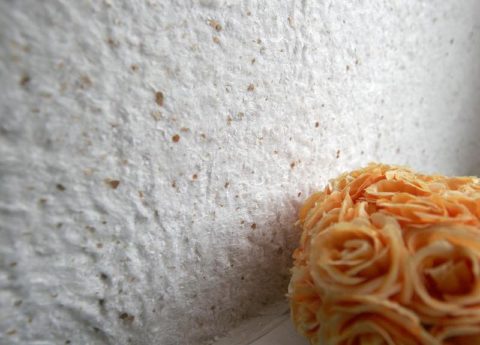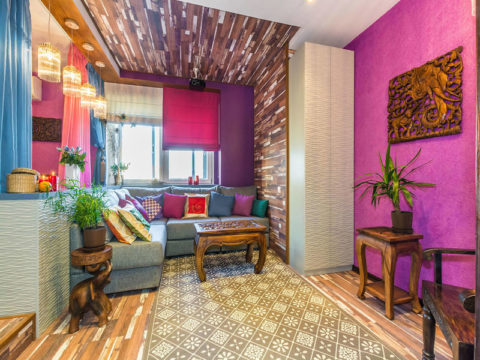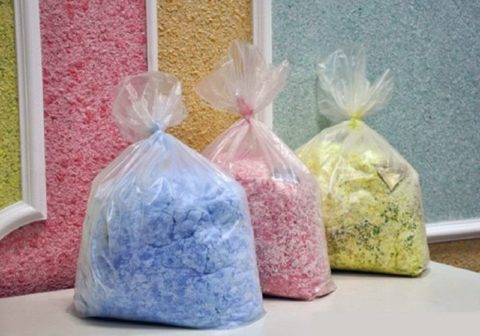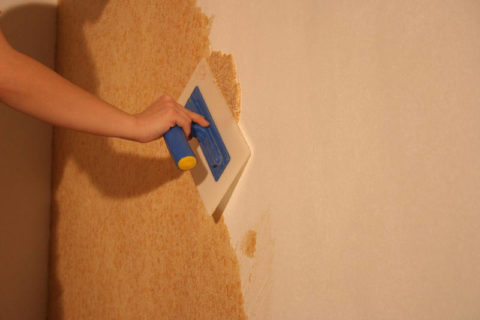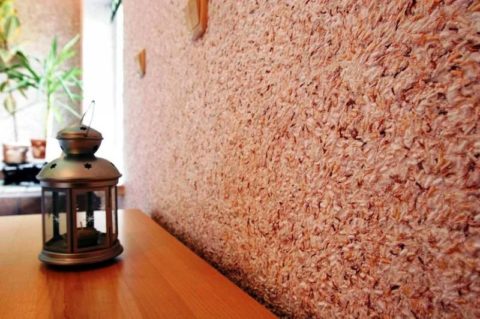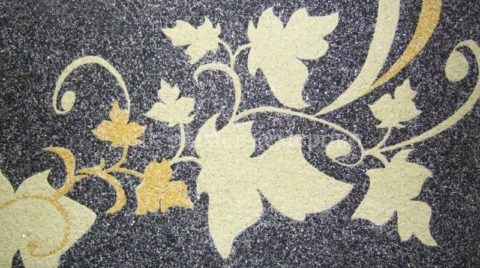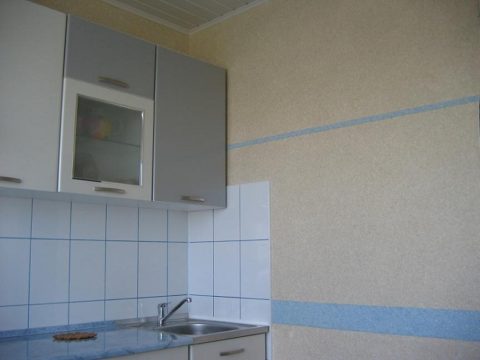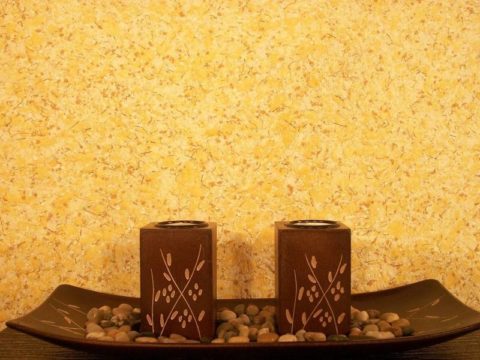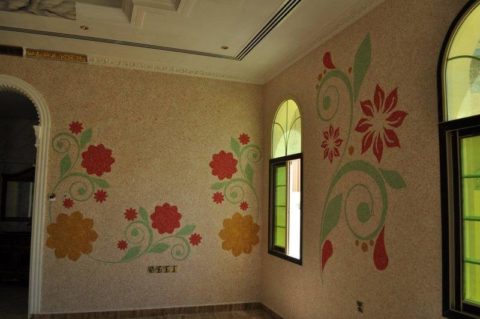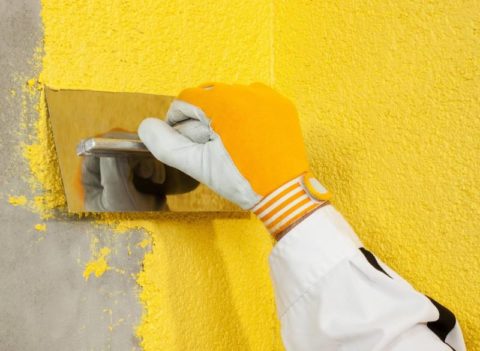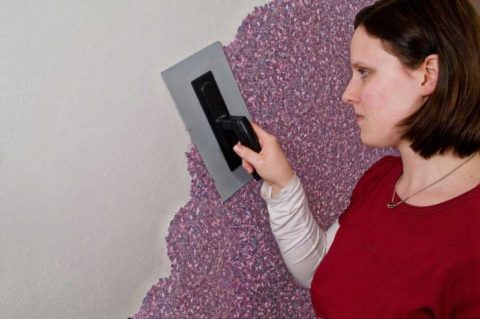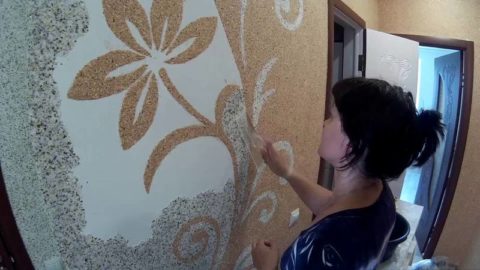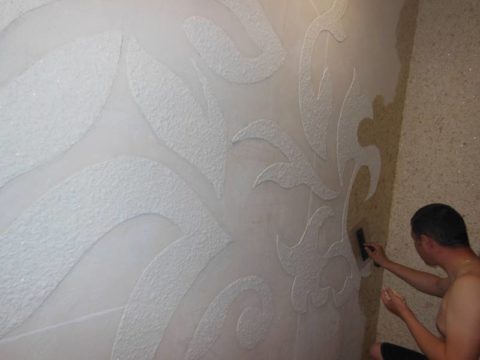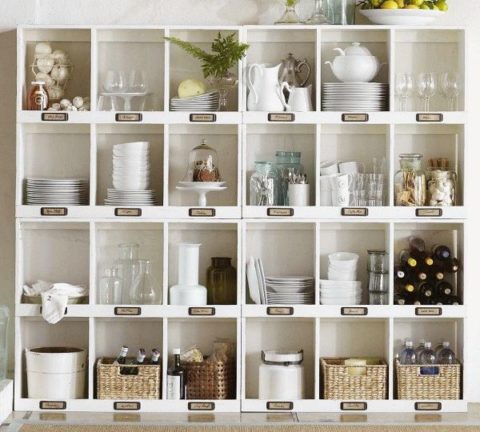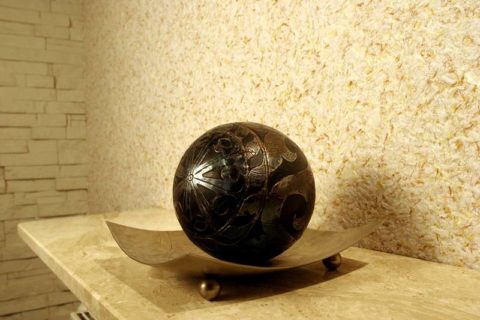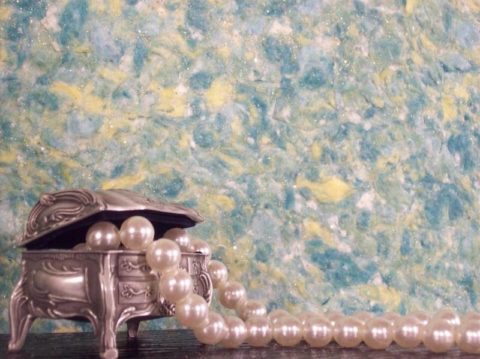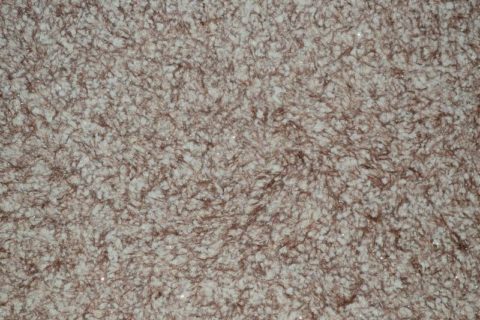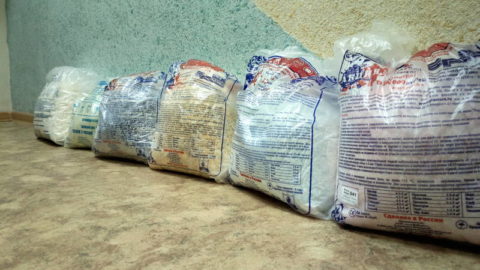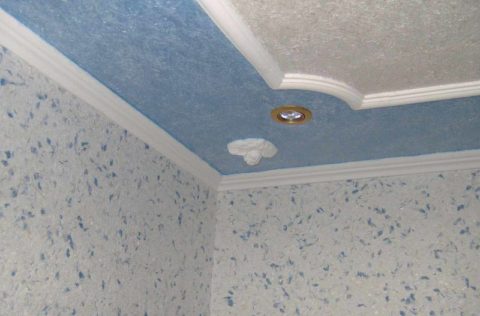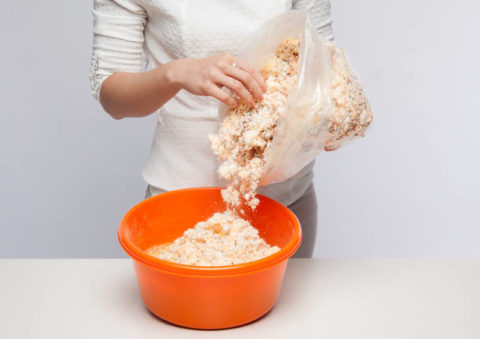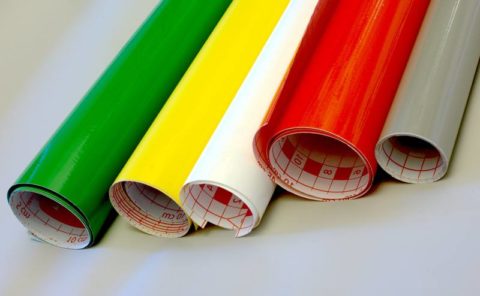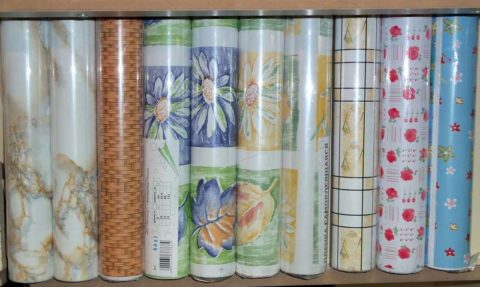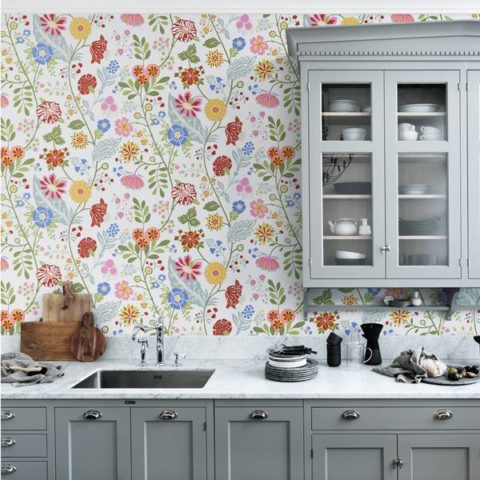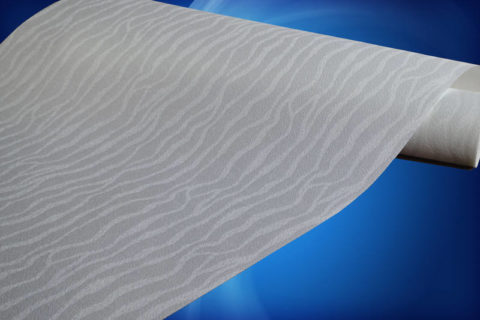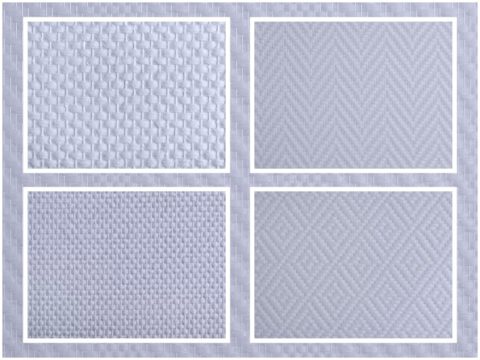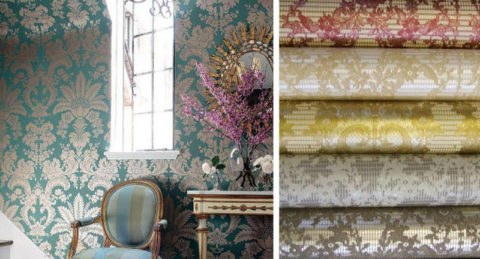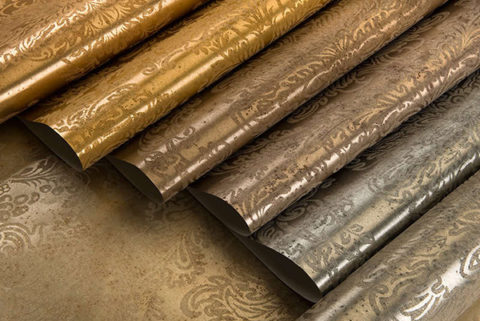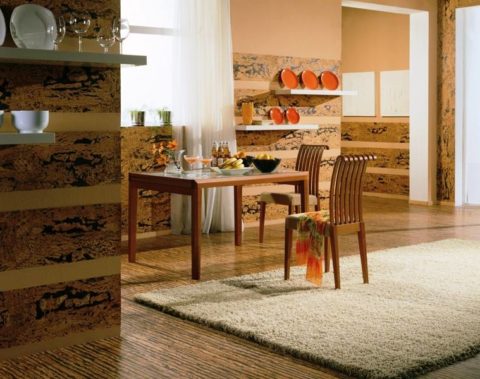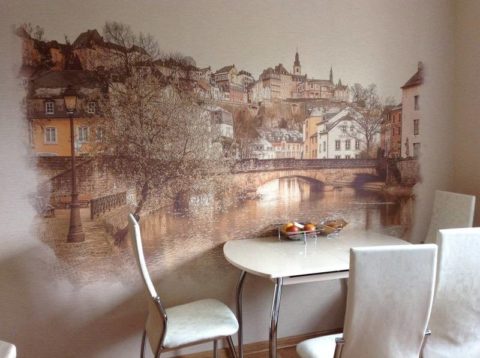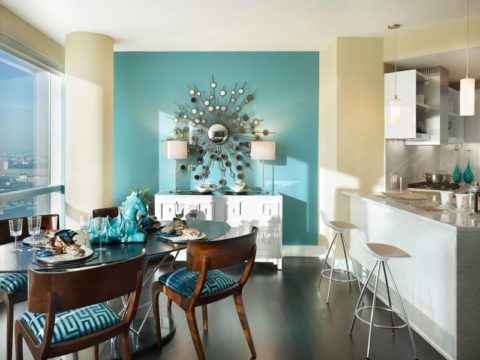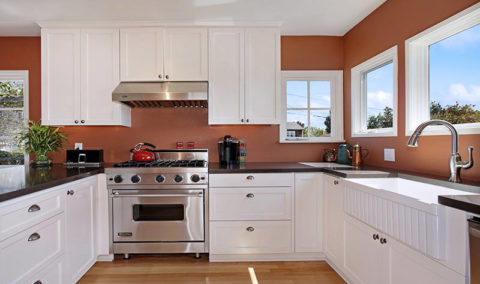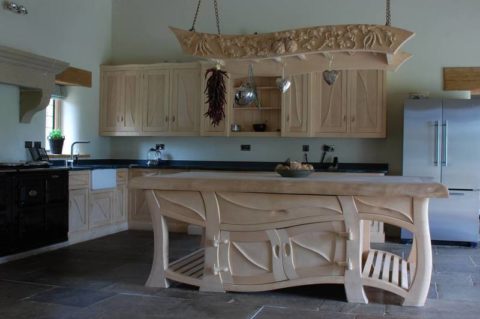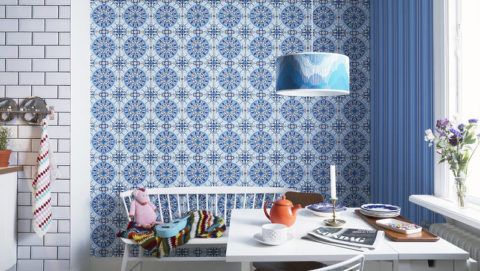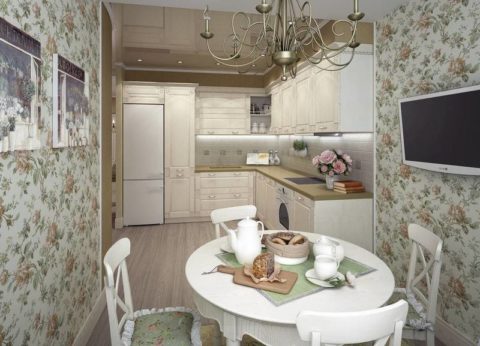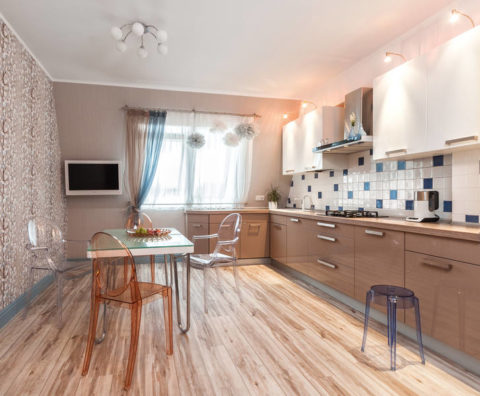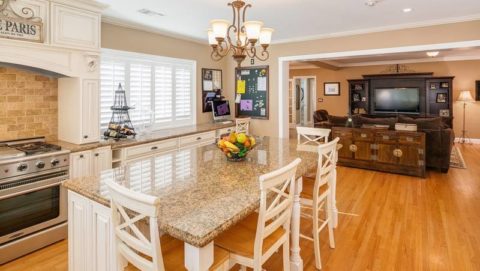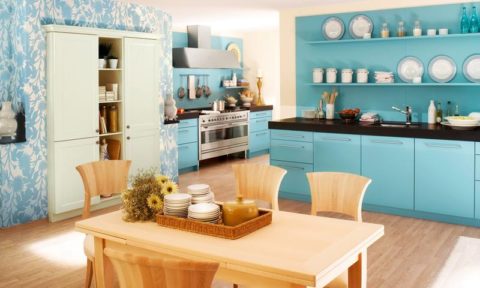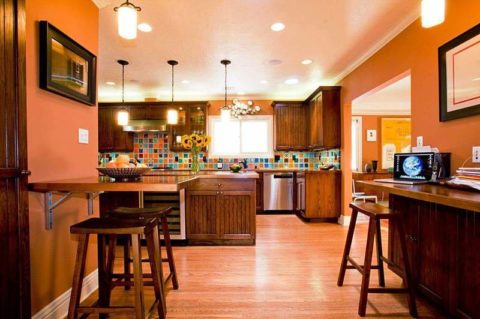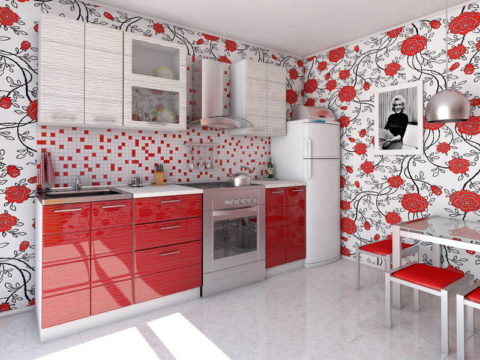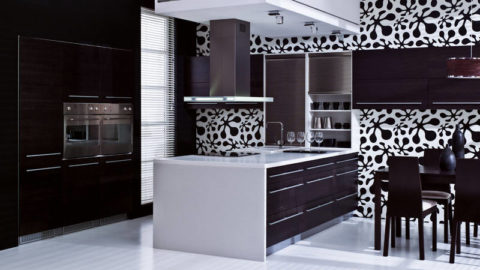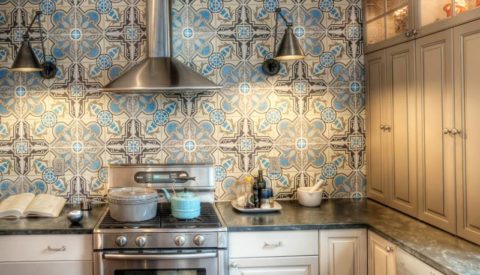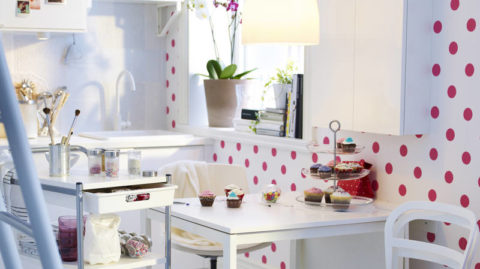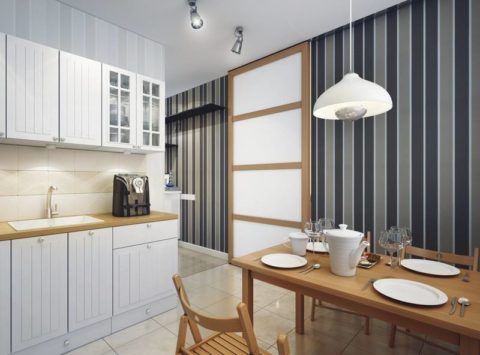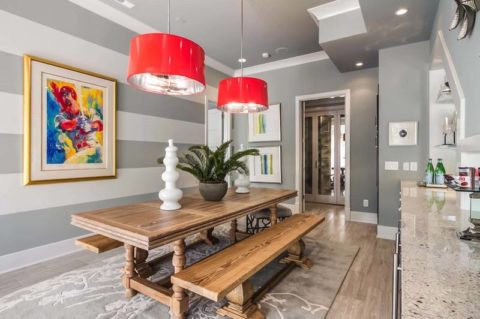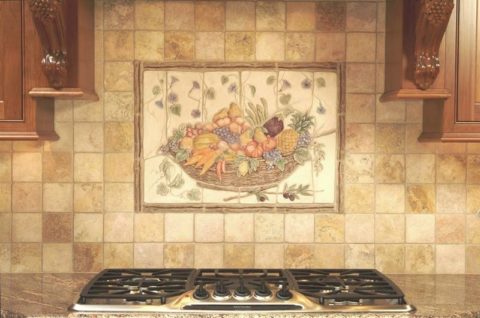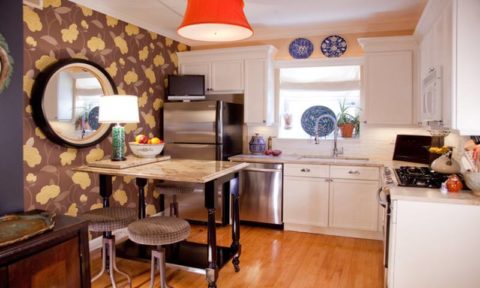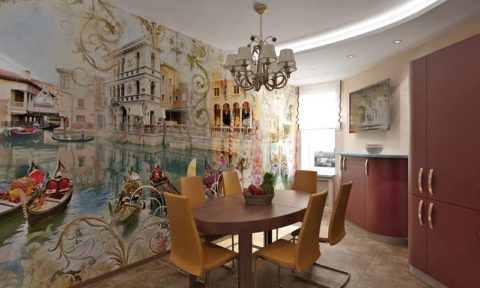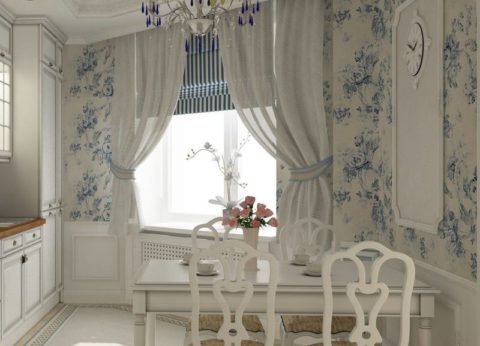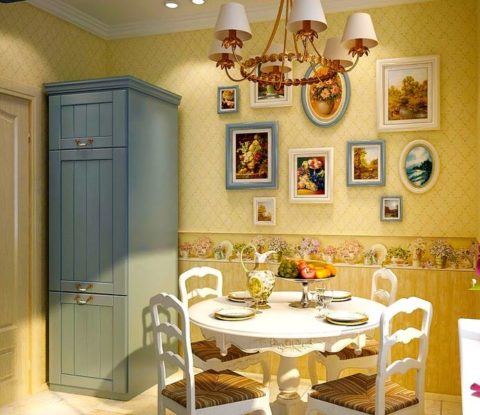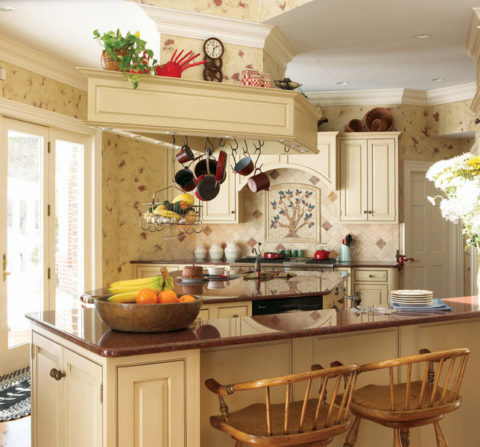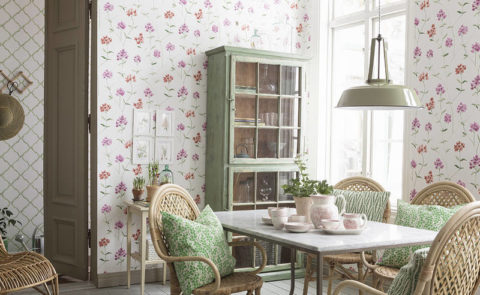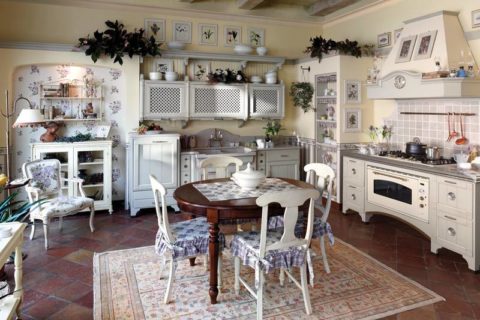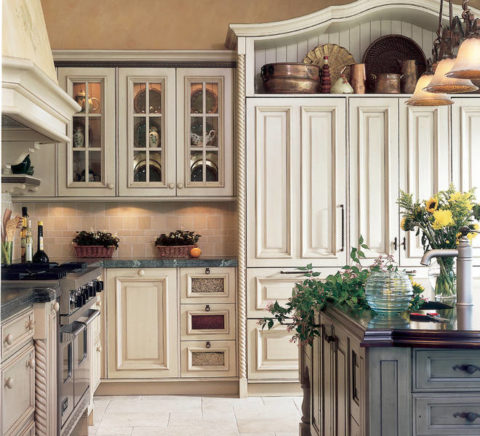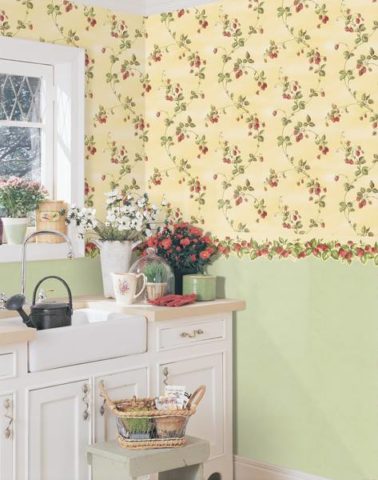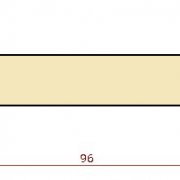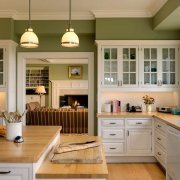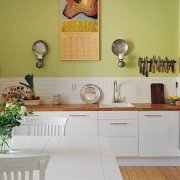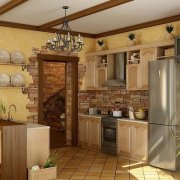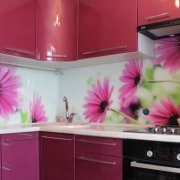How to paste the walls in the kitchen - types of wallpaper and their features
The kitchen is a room that is characterized by daily operating load. Therefore, the requirements for finishing materials in the kitchen are special - they must be moisture resistant to withstand the effects of steam, condensate and wet washing.
There are many finishing materials for the walls, and this article will explain how to paste the walls in the kitchen. After all, there are many varieties of wallpaper, and each one has some features and requirements for operation.
The content of the article
Wallpaper Recommendations
Despite the fact that the kitchen is traditionally considered a place where all family members gather together, and its interior design should be cozy and modern, still the main requirement for wallpaper for the kitchen - it is functionality, practicality and ease of care.
For the kitchen you must choose washable wallpaper - resistant to moisture. To choose the right wallpaper for their technical characteristics, you should be guided by the following tips:
- The first step is to read the information on the roll label, which reflects the technical and operational features of the selected wallpaper. For the kitchen, wallpapers should have the following qualities:
- Moisture resistance;
- Light fastness;
- Vapor permeability;
- High density coating.
- Preference should be given to a smooth wallpaper surface., since wallpaper with a pronounced texture of the pattern will accumulate pollution in its folds that are inevitable in the kitchen room;
- There is a fundamental difference between waterproof and washable wallpapers.. Water-resistant wallpapers cannot be washed - therefore, it is necessary to choose those products that are to be washed with a damp cloth;
- An important quality is odor resistancethat should not be absorbed into the outer layer of the wallpaper;
- When purchasing wallpaper, you need to make sure that the seller has a quality certificate and product compliance with hygiene requirements.
Wall surfaces, especially near hob surfaces, should be easy to wash without spoiling. It is also very good that the material could be redecorated.
For example, painting. There are such materials. They are made of modern materials with good performance, and are suitable for finishing the kitchen.
At the same time, modern wallpaper for the kitchen is perfect for creating any interior, at the request of the owner. These include vinyl wallpaper, compact vinyl, non-woven vinyl, silk screen printing, wallpaper for paintingcullet.
Wallpaper for the kitchen and their design are selected, first of all, taking into account the area and lighting. For small and dark kitchens, light, possibly plain wallpaper will be a real salvation.
Vertical curbs, very fashionable in recent years, will help visually “raise” a low ceiling.
Do not try to arrange an interior in an antique or classic style in a small kitchen. Kitchens decorated with wallpaper with a small, cute English pattern or in the Provence style, borders with rustic motifs will look more harmonious. You can also paste over the walls of the kitchen with delicate pastel wallpapers, and decorate the wall above the dining table with a photo collage.
For owners of large, bright kitchens with large windows or a balcony, you can arrange almost any interior: from high-tech to a kitchen in the style of a medieval castle. The walls in the classic kitchen are done in light colors. Moreover, modern designers advise using wall coverings of different types.
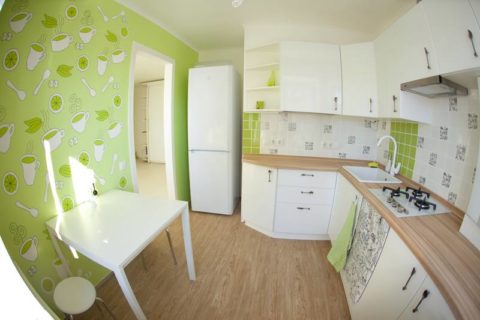
For example, in the dining area, you can use a large pattern that matches in color with another wall decoration.
Washable wallpaper in the kitchen
The walls in the kitchen are the most susceptible to contamination. Combustion products settle on them, regardless of whether there is an extractor hood in the kitchen or not - they periodically get splashes of oil and other liquid products.
The most suitable from a practical point of view, will be wall paint or tile. But what if you want to create a cozy kitchen with an atmosphere of warmth that can only be created by wallpaper-paneled walls? For this, special washable wallpapers are produced.
Their main qualities include the following:
- Judging by the name, the main quality is moisture resistance. Such wallpapers can often be washed with a sponge dipped in water with a detergent;
- With proper operation, such wallpapers have a sufficiently long operational period;
- There are a wide variety of types of washable wallpaper, which allows you to choose the material for a specific interior solution;
- The price of many wallpapers is affordable.
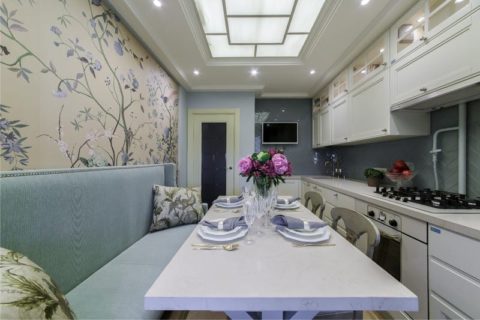
Do not forget about the decor elements on the free walls of the kitchen. What to hang on the wall in the kitchen? For example: a decorative clock that will become an ornament and an indispensable assistant in the kitchen.
Types of Wallpaper
Walls in the kitchen - what to choose? Choosing wallpaper for the kitchen, take into account the following factors:
- The general style decision of the apartment or house;
- Kitchen area;
- Degree of natural light;
- Individual preference regarding the color of the wallpaper and its texture is taken into account.
There are several types of wallpaper that, due to their qualities, can be used in the interior of a kitchen.
Paper
This is the most traditional and budget kind of wallpaper, but not all are suitable for the kitchen paper wallpaper. Since ordinary wallpaper, under the influence of steam and condensation, will very quickly lose their appearance and begin to exfoliate from the walls. The only acceptable option is paper wallpaper for painting.
In this case, the applied paint coating reliably protects the paper from moisture, and the paint itself is subject to frequent wet washing without losing its appearance. In any case, it is advisable to use such wallpapers away from the working area of the kitchen - the stove and the cutting table. They can be glued in the dining area.
Wall preparation
Since paper wallpapers do not have a high density, all wall defects will be visible when they are attached.This can be avoided with the help of high-quality putty of the base (see.How to putty walls under the wallpaper yourself).
The surface of the wall should be perfectly smooth, otherwise the wallpaper will not stick tightly to the wall during the gluing process, and eventually will necessarily move away from the wall.
The sequence of work is as follows:
- First, it is necessary to dismantle the old wallpaper and clean the walls from pollution;
- Deep cracks need to be expanded and sealed with starting putty;
- Then set the beacons and pull the beacon lines, which will be used as landmarks;
- Apply the first layer of putty, which will hide all the surface irregularities. The plaster should dry during the day;
- The second layer is applied after 24 hours, when the lower layer is completely dry. Its purpose is to hide all the irregularities of the lower layer;
- A day later, a putty finish coat is applied. It has a finer texture, so its layer after processing with sandpaper gains smoothness, and any subsequent coating layer will adhere to it quite firmly.
- When the walls are ready, it remains only to apply a layer of primer, wait until it is completely absorbed - and you can proceed to gluing the wallpaper.
Non-woven wallpaper
These wallpapers are of high quality, long service life and attractive appearance.
Important! The non-woven base does not shrink and does not stretch. When gluing a wall joint to joint, a monolithic coating with invisible seams is obtained.
Non-woven wallpaper have a basis in the form of a non-woven fabric made from a cellulosic composition mixed with mineral fiber. This is non-woven. Such a coating has soundproofing qualities, and can be painted more than 10 times with acrylic or latex paints.
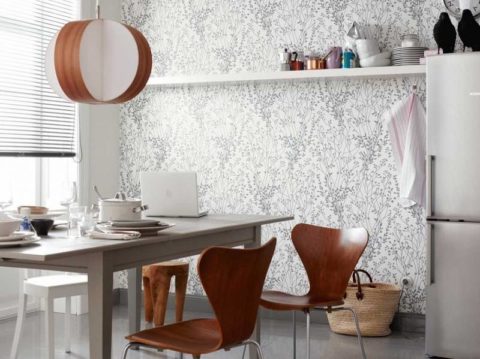
Important! It is not recommended to use gray shades in the interior of the kitchen - they help suppress appetite, and can even cause digestive upsets.
Non-woven wallpaper can have two or more layers. Double-layered wallpaper consists of a top decorative layer, which can be paper, vinyl or even textile. And the bottom layer is non-woven.
Multilayer wallpapers have several non-woven layers. At the same time, the lower layers are smooth, and the upper one has relief and can be painted, which allows you to use such wallpaper for any color scheme of the interior.
Of the positive qualities of non-woven wallpaper, the following can be noted:
- When gluing the walls, there is no need for their thorough preparation, since the dense basis of non-woven wallpaper effectively hides minor defects of the base;
- This material is able to withstand fire - nonwoven wallpaper is set on fire with great difficulty;
- Such wallpapers have vapor permeability, which is important under conditions of high humidity in the room. When processing the walls before pasting with antiseptic compounds and natural microventilation of the material, the formation of mold and fungus is excluded;
- Non-woven wallpaper is easy to stick. Due to their high density, they are sufficiently strong material, not subject to deformation. Due to the fact that the roll has a width greater than standard paper wallpapers, the process of pasting the walls is faster;
- Due to the fact that the material does not absorb moisture at all, the adhesive is applied to the surface of the wall, and not to the wallpaper. It also affects the speed of repair work;
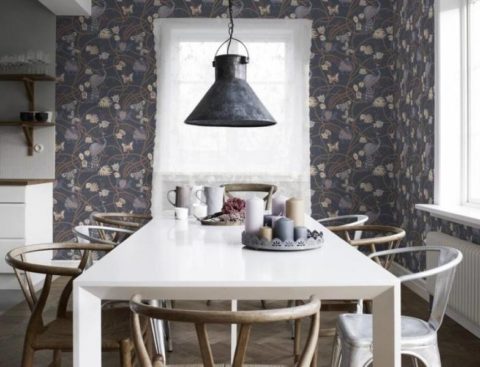
- Flizelin does not accumulate static electricity on its surface, so dust is not attracted to the wallpaper, which allows you to position this material as hypoallergenic;
- Pollution from the surface of such wallpaper is easily removed with a sponge and liquid detergents;
- This material does not fade when exposed to direct sunlight;
- Due to the fact that non-woven wallpaper can be painted, the interior can be transformed into various colors, and for this it will not be necessary to start serious repair work;
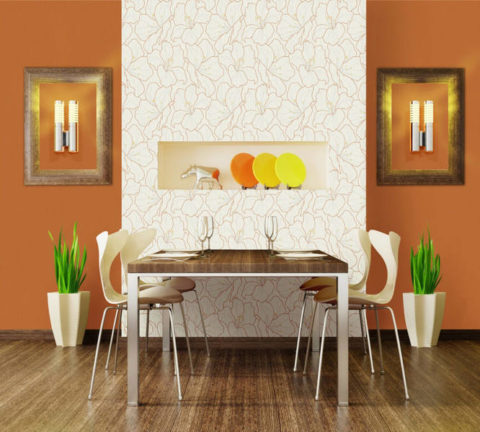
- The material is resistant to steam and high temperatures;
- Unpleasant odors are not absorbed into the surface of non-woven wallpaper.
Of the shortcomings, only high cost can be noted, but it is justified by the operational qualities of the material.
Non-woven wallpaper will be an excellent background for decorative wall elements. What can be hung on the wall in the kitchen? For example, mirrors framed in decorative frames. This will visually make the space lighter and more spacious.
Vinyl wallpapers
Wallpaper, without a doubt, is considered the most popular solution for decorative refinement of wall surfaces. And the most popular variety, of course, are vinyl-based wallpapers.
This type of wallpaper differs from ordinary paper products by the presence of a much larger variety of textures, more solid durability and light resistance, as well as the possibility of using wet cleaning.
Thanks to all these features, vinyl-based wallpapers are becoming almost universal, and can be used indoors for any purpose.
This type of wallpaper also belongs to the category of multilayer roll finishing materials. The basis of such wallpaper is a fabric or paper web, and the top layer is polyvinyl chloride. Due to their high strength characteristics and moisture resistance, such wallpapers are the most suitable option for the kitchen.
Important! The surface of vinyl wallpaper is so durable that it can withstand the effects of abrasive cleaners and hard brushes.
Vinyl wallpapers can have different levels of moisture resistance, so when choosing it is important to carefully consider the marking on the roll in the form of waves. For the kitchen, material with marking depicting three waves is suitable. This indicates the highest degree of moisture resistance and durability of the facial coating.
Note! This type of wallpaper is practically vapor-proof, and it is very good for interior decoration. This property makes the material a priority when decorating walls made of cellular concrete, which on the outside do not have a ventilated facade, but, for example, are faced with brick closely.
How to occupy an empty wall in the kitchen with vinyl wallpaper? On it you can hang a slate board. This is a stylish original solution that will allow you to decorate the wall in the dining area.
Varieties
Before you get this type of wallpaper, it is very important to decide which particular type of wallpaper is most suitable for this particular situation. Now the consumer is offered several different varieties of vinyl wallpaper, which, despite the fact that polyvinyl chloride traditionally acts as the main decorative layer for all of them, due to its various processing methods, they differ very seriously in terms of their quality characteristics:
- Special foamed vinyl coated wallpaper, have a fairly soft embossed surface, and have the ability to perfectly mimic the textures of quite a few other materials, for example, decorative plaster. The main feature of this type of wallpaper is that it has an extremely light weight and almost does not need to carefully level the working surface (thanks to its features, such wallpapers make it easy to mask various minor defects);
- Silk screen printing also can be attributed to the category of vinyl light wallpaper. However, at the same time, this material already needs very careful preparation of the working base, since under such very thin wallpaper not only minor irregularities, but even color differences will be perfectly visible. It is because of this that the walls, before gluing them, must be subjected to thorough puttying and high-quality grinding;
- Compact vinyl, as a rule, is characterized by increased complexity in work. But at the same time, it is considered the most practical type of such wallpaper - after all, such products perfectly tolerate washing and are extremely resistant to scratches. As for heavy vinyl, it, as the name implies, is also incredibly complex in terms of application. However, at the same time, it allows you to create a very sophisticated and original finish.
Liquid wallpaper
This is a modern material, which in the way of application resembles plaster, and in texture and technical characteristics - wallpaper. Hence the name.
This material is a dry mixture, which is diluted with water before application. Moisture resistance and surface strength of such a material can be achieved by coating it after drying with acrylic varnish.
Liquid wallpaper during application creates a seamless monolithic coating with strength and vapor permeability. However, it is not recommended to cover them with walls where the working wall in the kitchen is exposed to moisture, pollution and high temperatures.
Advice! Modern kitchen aprons made of transparent tempered glass, called “Skinali”, allow you to leave the wall decoration in sight and reliably protect it from adverse influences.
There are a variety of materials for a kitchen apron. How can I lay a working wall in the kitchen? It can be a traditional tile or mosaic, ready-made aprons made of glass or PVC, panels and natural or decorative stone.
Liquid wallpapers are perfectly combined with other finishing materials, so they can be combined with ceramic tiles or PVC panels.
This material is resistant to high temperatures and has soundproofing properties.
There are several conditions that must be observed when working with this material:
- It is necessary to apply liquid wallpaper on the wall at +10 degrees of the environment;
- The drying speed of the wallpaper depends on the thickness of the layer, its texture and room humidity;
- It is recommended to purchase liquid wallpaper with a small margin;
- Due to the fact that such wallpaper resembles plaster, special alignment of the walls is not required, since they can hide some of the base defects;
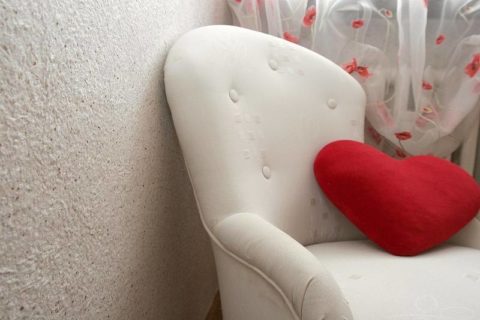
- To improve adhesion between the composition and the surface of the wall, the latter must be pre-treated with a primer twice - horizontally and vertically.
The positive qualities of liquid wallpaper include the following:
- Wallpaper is easy to prepare and apply. The powder is diluted with water in a ratio of 1 kg to 6 liters. They put wallpaper on the wall with a spatula, like plaster;
- They are environmentally friendly material due to natural components;
- A wide range of colors allows you to choose the material for any interior. It is also possible to change its texture after adding stone chips or sparkles;
- All work can be done with your own hands without assistance;
- An important quality is the seamlessness and solidity of the coating. Not a single rolled material gives such a result;
Important! Liquid wallpaper should be applied to a white surface. For this, the wall can be pre-painted with water-based paint.
- Like plaster, the material fills in small bumps on the wall;
- Due to the vapor permeability of the material, microcirculation is ensured in the room, which prevents the formation of fungus and mold;
- The coating is durable and resistant to mechanical damage. Even if this happened, the situation is easy to correct - just remove the damaged fragment and put a new layer in its place. Therefore, it is recommended to purchase wallpaper with a small margin;
- Using liquid wallpaper, a variety of patterns can be created on the wall surface by combining materials of different colors and textures.
Among the shortcomings, one can note the high cost of the material and the inability to wet wash wallpapers that are not varnished. In case of contamination, the fragment can be removed with a knife and a new clean layer is applied.
Important! If there are protruding fragments of reinforcement on the wall surface that cannot be removed, it is coated with paint so that rust does not subsequently appear on the surface of the wallpaper.
Application Method
To apply liquid wallpaper to the wall, certain skills are not required, it is enough to follow simple rules and the sequence of work performed:
- First you need to prepare the foundation. Old decorative coating must be removed. The wall must be cleaned and degreased;
- In the presence of large cracks, they are embroidered and plastered;
- The wall is covered with water-based paint to give it a white color;
- The surface is carefully treated with a primer, first performing movements with a roller in the horizontal direction, and then in the vertical, controlling the uniform distribution of the primer on the wall. Application of the material is started only after the soil has completely dried;
Important! On the package with liquid wallpaper there is an instruction on the procedure for diluting the composition, which must be strictly adhered to. The main condition is the sequence of mixing the components - so that the composition has a uniform consistency, first pour the powder into the mixing tank, and then add the required amount of water to it.
- The material is applied to the wall, like decorative plaster - with a spatula. You can take a small amount of material in your hand and attach it to the wall, and then smooth it with a tool or type a composition with a spatula. The layer thickness should not exceed 3 mm;
- If the edge of the previously applied composition began to dry, it can be slightly moistened with water;
- For uniform distribution of cellulose fibers, which are contained in the composition of liquid wallpaper, the movement during their application should have a small amplitude of different directions;
- Corner sections are treated with a grater or spatula in the direction "from the corner", and then distribute the composition in the selected direction;
- To remove bumps, after the entire wall is covered with a composition, a wet grater is passed through it;
- After 3 days, when the wallpaper is completely dry, they can be covered with acrylic varnish.
Important! When processing wallpaper with acrylic varnish, their vapor permeability is lost.
How to occupy a free wall in a kitchen with liquid wallpaper? Alternatively, these can be decorative shelves that will never be redundant in the kitchen.
Varieties
There are three main types of liquid wallpaper:
- Cellulose liquid wallpaper has the most affordable cost. They are able to hide minor wall defects, and are suitable for finishing even unheated rooms. The disadvantage is that such a material is not able to withstand direct sunlight, and over time its color fades;
- Silky liquid wallpaper contains natural silk. This is the most expensive version of liquid wallpaper, resistant to ultraviolet, and creates a silky decorative surface;
- Silk and cellulose-based fluidics are the golden mean in terms of price and quality. May contain natural cotton.
Material Tips
When choosing a material, it should be noted that it can be sold in two forms. This may be a ready-made dry mixture having a certain color, which only needs to be diluted with water.
In the second embodiment, the material is sold in the form of a kind of raw white, in which it will be necessary to add dye and elements to form the texture. In this case, some dye skills will be required to obtain the desired shade.
Liquid wallpaper can be used to decorate the ceiling. In this case, they must be treated with acrylic varnish, since it is on the ceiling that a large amount of condensate accumulates.
The package always indicates information on the degree of moisture resistance of the material and its drying time, which can be 12-72 hours.
Self-adhesive wallpaper
This type of material is a film with an adhesive layer and a protective substrate, which is removed before applying the material to the wall.
Its positive qualities include the following:
- The material has impact resistance;
- Moisture resistant;
- A decorative surface can imitate a variety of artificial and natural materials;
- The surface is resistant to chemicals and alkali;
- Easy to apply and care - dirt is easily washed off from a smooth surface.
This material is sold in the form of rolls with markings on the back, which allows you to cut an even fragment of the required size. When applied to the wall, the back protective paper substrate is gradually removed as the material is glued and smoothed.
Acrylic Wallpaper
This material has a paper base and a polymer velvety coating on the front side. The material is quite durable due to its high density.
It is suitable for use in the kitchen, as the top layer has moisture resistance and wear resistance. An important condition is the exclusion of cleaning such wallpapers with synthetic brushes.
Cullet
This is a highly decorative material with significant strength.The environmental friendliness of this material ensures the presence of dolomite, soda, quartz sand and lime in its composition. Cullet belongs to the category of washable materials.
They are not afraid of mechanical influences - they are difficult to scratch or tear. The material is heat and moisture resistant. They can be treated with detergents containing acid and alkali. When staining such wallpapers, their texture is preserved.
Metallic Wallpaper
This is a modern material from the category of washable wallpaper. They can have a fabric or paper base on which a thin aluminum foil is applied with a pattern applied by stamping.
Such wallpapers have an expensive appearance, and with dignity tolerate any wet cleaning. Of the disadvantages, it is possible to note the complete air tightness of the material, so they can be used in well-ventilated rooms.
Cork Wallpaper
This is a natural kind of wallpaper based on pressed cork. Available in the form of sheets that are glued to the wall and varnished.
They have a long operational period during which they retain their original appearance. May be wet treated. They are environmentally friendly material.
Designer Tips
When choosing a color scheme for the kitchen - and, consequently, the finishing material, it is recommended to consider the following:
- Solid light wallpaper will visually increase the small space of the kitchen;
- If the room is large, you can make it cozy with the help of wallpaper in dark colors;
- Traditional colors for the kitchen include beige, yellow, orange. Brown walls in the kitchen will blend well with a golden hue;
- Neutral plain wallpaper favorably emphasizes decorative elements and furniture of non-standard shapes;
- The color scheme of the walls should correspond to the chosen style of the kitchen room. If it's country or provence, then natural shades will do. For high-tech style, black and white colors can be used. The marine theme involves the use of white, blue, blue and sand tones. Pop art is characterized by bright saturated colors - yellow, pink, red;
- Which walls are better in a small kitchen? Plain, embossed - or wallpaper on which a discreet light-colored drawing is applied. If the color of the flooring, furniture and door leaf is made in bright colors, then the wallpaper can be bright;
- For rooms with a lack of natural light, light wall decoration is chosen;
- Wallpaper should be combined with the color and texture of the available interior details;
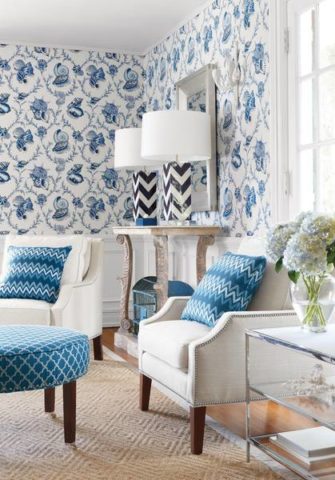
- For the kitchen-living room, a single style solution should be chosen;
Important! It has long been proven that color affects the emotional state and physiological manifestations of the human body.
Solid blue on the walls of the kitchen and its shades will be the result of a decrease in appetite.
Juicy yellow and orange colors have the opposite effect.
The use of red should be dosed, otherwise it is exciting and annoying.
Black, brown and violet colors require careful use - and only as an accent indoors.
Floral motifs and other patterns on the surface of the wallpaper are so diverse that you can get confused when choosing them.
Therefore, it is recommended to take into account some nuances:
- The artsy and unusual ornament on the wallpaper is suitable for the kitchen, the furniture in which does not differ in complex decorative elements;
- The size of the fragments of the picture depends on the area of the room. The smaller the space, the smaller the drawing should be;
- To visually “raise” the height of the room, you can use wallpaper with a diagonal or vertical arrangement of not too wide stripes;
- Horizontally located strips will make the space wider and visually reduce its height;
- Wallpaper imitating ceramic tiles allows you to create a traditional kitchen interior for less money.
Material combination
This is a great solution for decorating the kitchen. Combining various textures and shades, you can get a unique unique design solution, highlighting the individual functional areas - the workspace and the place of eating.
Combining white and black, red and black, blue and yellow, blue and silver, or green and gold, you can get an unusual decorative space.
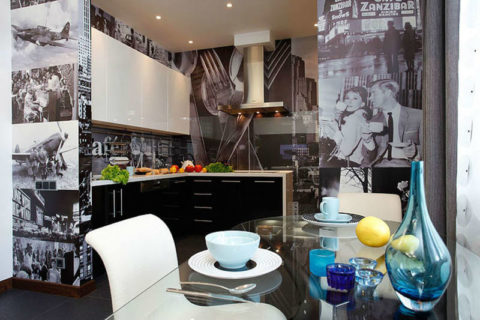
The use of photo wallpaper allows you to effectively highlight the functional areas, and to place accents in the kitchen.
Important! Combining materials, it should be borne in mind that the quality of their appearance should be equivalent. Do not try to combine cheap and expensive materials. Such a contrast will be obvious, but will only bring a negative effect.
Wallpaper in the style of provence
One of the traditional styles for decorating the kitchen is Provence.
It attracts with its lightness, simplicity and cute design. This is southern France, slightly whitened from the bright sun with its lavender meadows, Van Gogh's sunflowers and Mediterranean marine motifs.
The gentle and romantic French country, in all its diversity, leaves great scope for creative design ideas. Simplicity and naturalness are the basis of wall design.
In style there is no place for cutting-edge materials and technologies. For many, Provence-style wallpapers are a small flower on a light background. However, this is not quite true.
A true traditional Provence is a wallpaper with a rough texture of bleached plain linen, an imitation of plaster and brick, a wallpaper that imitates painted boards, creating an excellent plain background of a rustic interior. Against this background, the paintings of the great masters of Provence - Van Gogh and Paul Cezanne - will look great.
The color palette of the style is different in pastel colors with bright color accents. But even the bright colors of Provence-style wallpapers here should be a little faded under the southern sun, like a whitewashed terracotta brick.
White, milky, beige tones, cocoa with milk, lavender, olive, cream, sand, ocher and terracotta create large bright spaces. There are no dark tones in this style. This interior is characterized by a combination of pastel blue with pale yellow color, symbolizing flowering meadows.
Plain-colored wallpapers in the Provence style can be revived a little with a border with small flowers or panels popular in our time, made using liquid wallpaper.
A strip and a simple cell, as well as a wealth of plant patterns are also characteristic of Provence.
Roses, lilies, peonies, small flowers of lavender and alfalfa, as well as birds, butterflies, ruffles and lace patterns - these are quite frequent motifs that designers of famous wallpaper factories use to create wallpapers in this style.
The video in this article will talk about how to decorate the kitchen space, and how to occupy a free wall in the kitchen.
